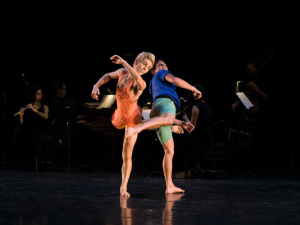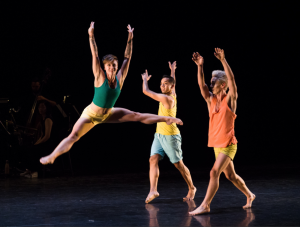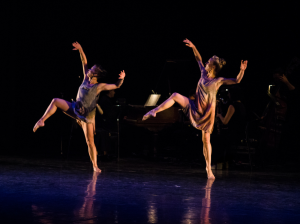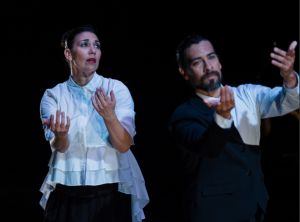Malashock Dance, Judd Greenstein Premiere “The Jewish Pope”

Andrew Holmes and John Paul Lawson in “Change.” Photo: Jim Carmody
Choreographer John Malashock and composer Judd Greenstein were clearly separated at birth, there’s such a splendid affinity between them. Malashock has created some of his most memorable dances to Greenstein’s music, starting with the radiant “Great Day” (2014).
Last night, Malashock Dance premiered two pieces to Greenstein works, as well as three premieres to music by other contemporary classical composers. The program is called “Minor Fall/Major Lift,” but that’s a misnomer, because all I experienced was a major lift, especially since the music was performed live by the New York-based NOW Ensemble. Hallelujah.
And be warned—the show runs this weekend only! You may want to stop reading for a moment and get your tickets immediately.
A word about the NOW Ensemble. Founded in 2004, the group features unusual instrumentation: flute, clarinet, electric guitar, double bass, and piano. It has premiered 100 works and racked up accolades. NOW is in San Diego for a residency with Art of Élan, the exciting young chamber group based here. Art of Élan performed with Malashock Dance when it did the first Greenstein piece and is coproducing “Minor Fall/Major Lift.”

Brittany Taylor, Justin Viernes, and Andrew Holmes. Photo: Jim Carmody
The program opens with “Change,” to Greenstein’s work by that name. (All of the dance titles come from the music.) As flutist Alex Sopp introduces a playful repeated phrase, seven dancers, wearing Popsicle-bright togs, break into wiggles and swivel-footed shifts like kids on a playground discovering what their bodies can do. (Elisa Benzoni designed the costumes for all of the dances. And Jennifer Setlow’s lighting artfully balances our attention between the musicians at the rear of the stage.)
The dancers scamper, lift each other, circle their hips as if they’re spinning hula hoops. Three dancers roll quickly across the stage. Lara Segura does a flirty duet with Andrew Holmes. In a sweet section, six dancers play in pairs as Blythe Barton watches from the side, yearning to join in but too shy to approach. Then the others leave, and she does a joyous, arm-flinging solo, the exuberant dance of all shy people when no one’s watching.
“Change” was so delectable, it felt impossible to top, and it remained my favorite. But that made it the best of a strong evening of music and dance.
Composer Patrick Burke’s “Awake” opens with pianist Michael Mizrahi reaching inside the piano and plucking the strings, and creating the kind of “Don’t go in the basement” sound you hear in horror flicks. Four dancers—Holmes, Andrea Rehm, Brittany Taylor, and Justin Viernes—do impeccably-timed acrobatic moves as the music takes on a Javanese flavor. Though it was a treat to watch these exquisite movers, the vocabulary of handstands, balancing on another dancer’s thighs, etc. struck me as too-classic Malashock, not venturing sufficiently into new territory.
To the urgent, lyrical “Everness” by Mark Dancigers, eight dancers connect in pairs, trios, etc., in a no-fixed-points composition where interesting things are happening all over the stage, and the whole feels absolutely right. In one section, brief musical phrases are followed by rests; the dancers echo the starts and stops in a beguiling music-movement conversation. And there’s a nice humorous touch (which I won’t give away) at the end.
Dancigers, who is NOW ‘s guitarist, did a new arrangement of this 2013 piece that’s premiering in this performance. A further musical pleasure is hearing violinist Kate Hatmaker, the director of Art of Elan, playing with the NOW Ensemble.

Brittany Taylor and Andrea Rehm in “Waiting in the Rain for Snow.” Photo: Jim Carmody
Five dancers do quick changes in direction to pelting notes in “Waiting in the Rain for Snow” by David Crowell. The three women stand with one leg extended, and the men push their legs as if walking through turnstiles, an apt image for shifting from one state to another. In this piece, the music—Sopp’s flute and Alicia Lee’s clarinet joining in just-the-edge-of-discordant harmony—so grabbed me that most of my notes are about it, rather than the dance.
After a music-only piece (“Night Train to Chuncheon” by Jonghee Kang), the program ends with another double premiere—a dance by Malashock set to a new piece by Greenstein, “The Jewish Pope.”
Commissioned by Art of Élan to compose a piece for this program, Greenstein turned to a folk tale in which a Jewish child is stolen from his family, raised as a Christian, and becomes the pope, but ultimately returns to his people.

Lara Segura and Justin Flores in “The Jewish Pope.” Photo: Jim Carmody
As plaintive klezmer-style clarinet melodies weave through the score, Malashock mounts a visually rich piece with the eight dancers in various combinations of black and white. A grid of light and shadow (created by Setlow) represents a chessboard, since, in Malashock’s take on the tale, the Jewish father and son are united not only by blood but by a shared love of chess.
Malashock has done a number of notable narrative pieces, and, in “The Jewish Pope,” the boy (Holmes) and his parents (Justin Flores and Segura, both deeply expressive as the bereft parents) are clearly identifiable. Too identifiable, perhaps. While the storyline comes through well, this piece didn’t fully gel as a dance. Although there may never be another opportunity to do “The Jewish Pope” with live music, I’d love to see Malashock revisit and refine it. Based on the evidence of “Great Day” and “Changes,” Greenstein’s music can bring out some of Malashock’s most exciting work.
“Minor Fall/Major Lift” continues at the Lyceum Theatre tonight at 8 p.m. and tomorrow at 4 p.m. and 8:45 p.m. Tomorrow evening’s performance is part of the Lipinsky Family Jewish Arts Festival.

Award-winning dance journalist Janice Steinberg has published more than 400 articles in the San Diego Union-Tribune, Dance Magazine, the Los Angeles Times, and elsewhere. She was a 2004 New York Times-National Endowment for the Arts fellow at the Institute for Dance Criticism and has taught dance criticism at San Diego State University. She is also a novelist, author of The Tin Horse (Random House, 2013). For why she’s passionate about dance, see this article on her web site, The Tin Horse

great show, excellent review!